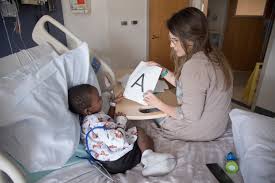Career Spotlight: Hospital Teachers

A hospital teacher helps a child learn the alphabet.
January 24, 2019
Have you ever wondered how children in the hospital manage to keep up with their schoolwork? So much emphasis is put on education these days, and it can be a real detriment to a child’s development to take a long break from learning. That’s where hospital teachers come in; they make sure students get the curriculum they need to return to school on the same page as the rest of the class. If you know you want to work in education, but teaching in a regular school environment doesn’t sound appealing, then hospital teaching could be the right fit for you!
What makes hospital teachers different from regular teachers?
For one thing, the environment is a lot different from a school setting. The children hospital teachers interact with every day are sick, so it’s important to encourage a positive attitude and bring some normalcy back into their lives. As Tom Mango, a hospital teacher from The Children’s Hospital of Southwest Florida, says: “… when I’m in the room with them, very rarely will I say: ‘What do you have? How are you feeling?’” Another difference is that they often teach the children one-on-one like a tutor. Being able to work with only one child at a time allows hospital teachers to tailor the lesson plan to each individual. Lastly, some children don’t have a curriculum from school to follow, and it’s the hospital teacher’s responsibility to use other resources, be creative, and make up their own lesson plans.
What personality traits and characteristics do you need?
- Kindness and empathy are extremely important for hospital teachers because the sick children are going through a lot. Understanding that their struggles are tough, supporting them, and giving the care they need is a must.
- Teamwork and communication are also important because hospital teachers have to coordinate with other teachers and doctors. Communication in a child-friendly manner is important for their learning, but it’s also necessary to keep their parents posted on what progress their child has made. On top of that, hospital teachers talk to the student’s normal teachers and vouch that they’ve been learning and keeping up.
- Flexibility is also major in this job because working in the hospital rooms is a very different environment, and they oftentimes need to adapt by making their own lessons.
- A positive attitude helps the students take their minds off of their struggles and allows them to focus on learning while having fun.
- Possessing knowledge of kindergarten level material up through high school may sound overwhelming, but a range of people end up in the hospital, and it’s your responsibility to educate all of them!
What schooling do you need?According to CareerTrend.com, hospital teachers need “a minimum of a bachelor’s degree,” and earning a degree in elementary education is also desirable. If you also want to work with high school age students, you’ll probably need a degree in a specific area such as biology. However, hospitals will have an assortment of hospital teachers who work together as team to help all the students!The Upsides
- Working with children and making their day more happy in an otherwise depressing environment
- Relieving parental stress by assuming responsibility for the patient’s education and making sure he/she doesn’t fall too far behind
- Being inspired by the children who always give their best effort, even if they’re really sick
- Having a positive attitude and appreciating life
- Working with other teachers and feeling a sense of community
The Downsides
- Sometimes the students are extremely ill and could die. Even though this is a possibility, you would have to maintain a positive attitude and give them hope for a better future better by teaching them.
- Making your own lesson plans could be difficult, and you might need help figuring out which resources to draw from. The goal is to match what the child is learning in school and continue his/her education to the best of your ability.

